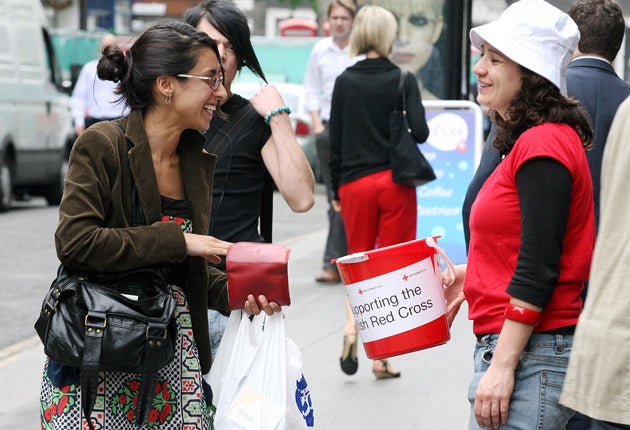Charities forced to merge or lay off staff as economic crisis hits their funding
Services for the most vulnerable are in jeopardy as donations dry up

UK charities are facing a severe funding crisis as public service cuts affect their budgets and donations are predicted to remain at rock-bottom for at least another year.
One in three charities is considering merging with another charity while one in six ponders joining a commercial organisation to ensure its survival, according to a survey by a leading firm of charity auditors.
One in 10 charities has made staff salary cuts and redundancies and almost a third have deferred projects. One in 20 is looking to sell assets such as properties to plug the funding gap, Baker Tilly found in its study of 175 leading charities.
The cuts could have a "devastating knock-on effect for society" as services which are relied on by many vulnerable people are put in jeopardy, the business adviser warned.
This worrying report comes after an extremely difficult year for charities. Many have seen donations plummet during the recession. Corporate giving has dried up and individual donors have reduced their gifts. Now with many experts predicting no significant recovery until the fourth quarter of 2010, many charities which have so far weathered the storm are concerned about how to keep their services going.
The biggest concern for charities is public spending cuts. This will hit charities hard as government funding is now the single biggest income source across the charity sector.
More than a third of respondents had already seen a reduction in government funding, with nearly two-thirds anticipating a further drop in the next 12 months. Meanwhile, 93 per cent of respondents reported a drop in investment income, with 61 per cent recording a significant fall.
More than four in 10 charities have already seen a fall in individual giving with nearly one in 10 reporting a significant drop. Corporate giving has fallen for 39 per cent of respondents with an even larger proportion predicting further reductions over the coming 12 months.
Andrew Hind, chief executive of the Charity Commission, said: "This survey shows that increasing numbers of charities have woken up to the imminent reduction in public spending.
"While charities have no control over this funding environment, it's the steps they take now that can even the odds when meeting the challenges ahead. I'm particularly encouraged that over a third of respondents are considering methods of joint working or merger – a potential solution the Commission has been urging boards to consider since the downturn began."
Karen Spears, head of charities at Baker Tilly Restructuring and Recovery LLP, said: "With 90 per cent of respondents not currently seeing any significant improvement in the economy for their charity, and 45 per cent not expecting any positive change until the last quarter of 2010, charities will need to constantly review the position and take steps to control their finances while ensuring that the charity's objectives are met.
"Some have not used the good advice available to them. Hiding their heads in the sand is not an option. Charities need to regard this as an opportunity to examine their objectives, and revisit core activities and projects."
Case study: 'We suffered the most catastrophic collapse of contributions imaginable'
*For Acorn Children's Hospice Trust, which runs three children's hospices in the West Midlands, 2010 looks as if it will be just as bad a year as 2009. But neither will be as diabolical as 2008, when £1.5m of donations dried up in six weeks.
"Between October and mid-November 2008, we suffered the most catastrophic collapse of voluntary contributions we could have imaged," said David Strudley, chief executive of the charity which supports 500 children with life-limiting or life-threatening conditions, and their families.
"Both individual and corporate donations just vanished. The corporate tap seemed to have been turned off, and also people had stopped giving those ad hoc sums which were so important to us. Our legacy income was also hit as the probate process took longer because houses wouldn't sell.
"It all came together in that six-week period of absolute ghastliness. It was an absolutely dreadful time. Our investments had fallen away and when we went to friends to see if they could help us they were in exactly the same boat themselves. In January we were forced to make redundancies and lose 19 people out of 320. It was the most painful thing we have ever done and the wounds are still healing. Since then, we have had 10 months of concentrating on getting income and expenditure to balance. Next year, we are expecting more of the same. We went straight down an almost vertical drop and over this year we have just bobbed along the bottom. However, we have thrived in a couple of areas – our 43 charity shops have made a profit as more and more people come in – including people who probably wouldn't have shopped in a charity shop before. I think 2010 will mean more of the same.
"Yes, we are still in survival mode but there are some things to be positive about. We are confident we will survive 2010, having managed to survive 2009. I am nowhere near as gloomy as I was this time last year."
Subscribe to Independent Premium to bookmark this article
Want to bookmark your favourite articles and stories to read or reference later? Start your Independent Premium subscription today.

Join our commenting forum
Join thought-provoking conversations, follow other Independent readers and see their replies